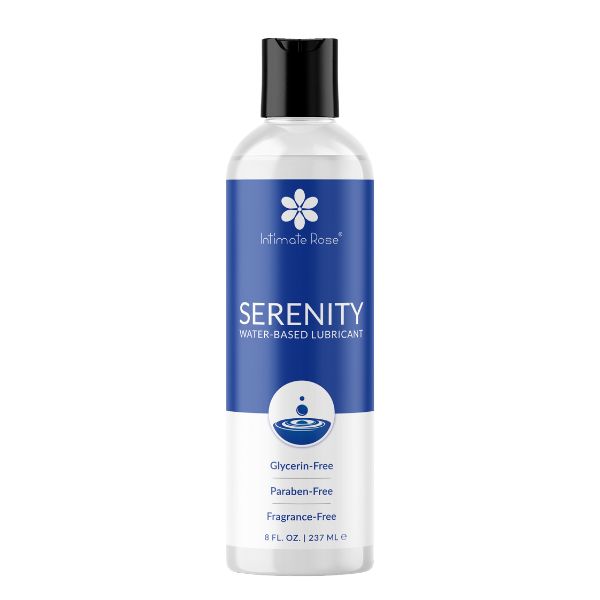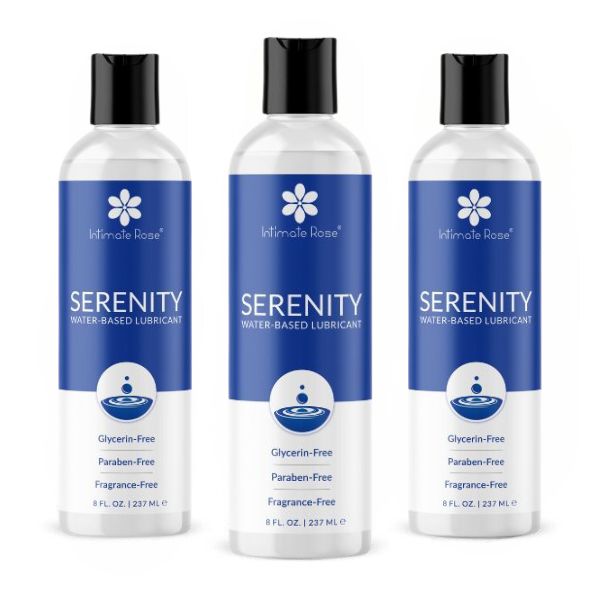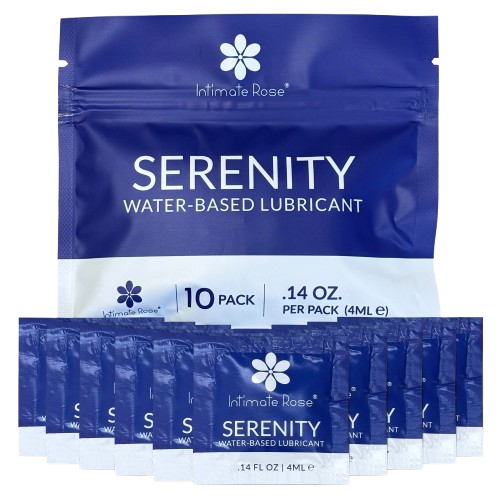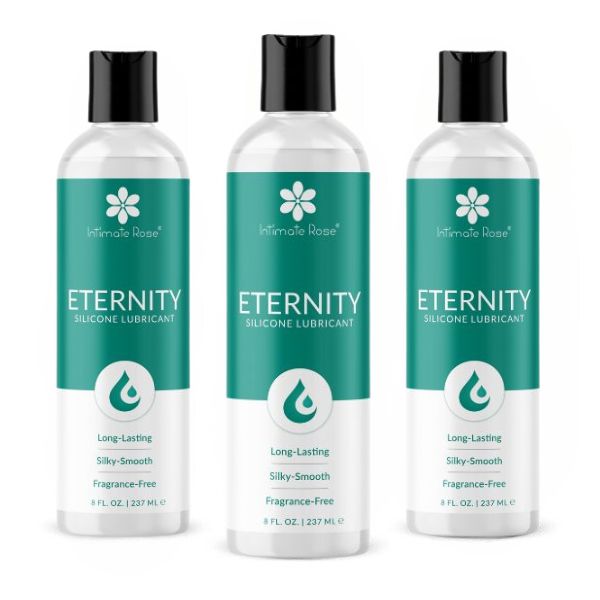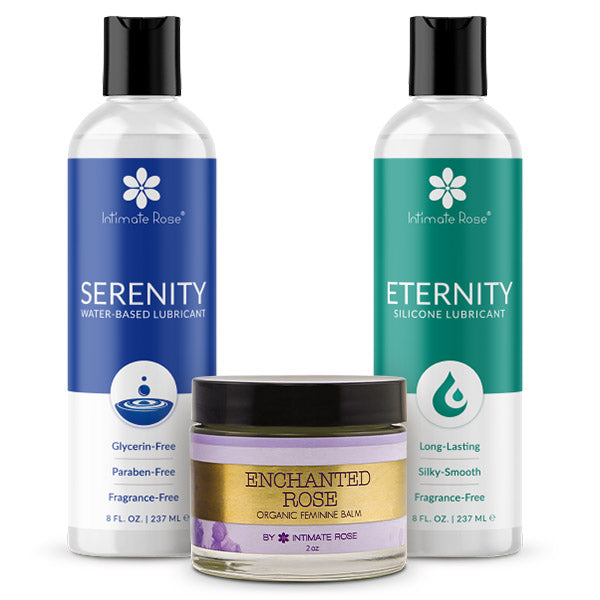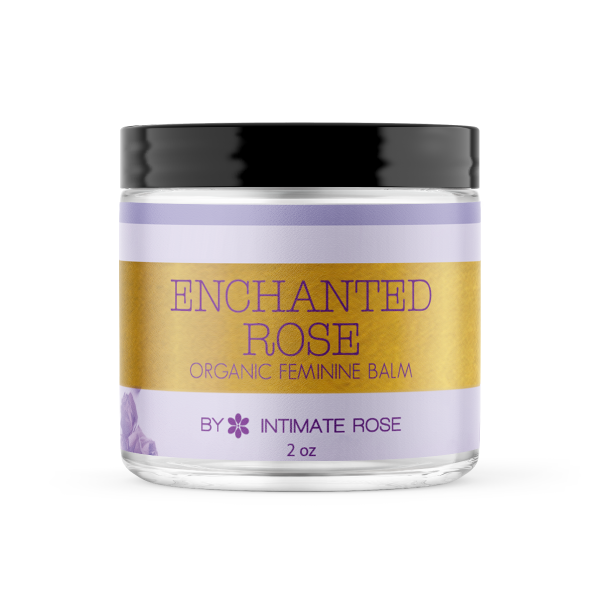Painful sex after menopause is a common issue that is typically caused by a drop in estrogen levels. Medically referred to as dyspareunia, pain during sex is similar to other menopause symptoms in that it can be mild for some and substantially life-altering for others.
While it is important to consult with your healthcare professional to understand the underlying effects of decreased estrogen, some effective natural remedies can also help to relieve discomfort and help you to enjoy more pleasurable intercourse after menopause.
What Causes Painful Sex After Menopause?
- Decreased estrogen
- Tight pelvic floor muscles
- Urinary issues
- Emotional stress
Although decreasing estrogen levels are at the root of most menopause symptoms, lifestyle choices, previous pelvic surgeries, traumas, or childbirth can also contribute to painful sex during menopause. Stress, body issues, a fear of intimacy, and urinary issues are some other variables to consider.
Decreased Estrogen & Painful Sex After Menopause Explained
Throughout the reproductive stage of life, estrogen helps to naturally lubricate the vagina and keep the vaginal walls healthy and pliable. As women enter menopause, however, estrogen levels incrementally decrease, the vaginal walls begin to thin & lose elasticity and the production of natural lubrication slows.
The lack of natural vaginal lubrication often leads to a condition known as atrophy, or vaginal dryness, which can result in mild to severe pain during sex. When the vaginal walls thin and lose elasticity, they also become more delicate and susceptible to tearing or bleeding during sex.
These microabrasions can lead to pain during or after intercourse, sometimes resulting in a fear of penetration, or a condition known as vaginismus where the vaginal walls involuntarily tighten at the thought of sex to protect the vagina from expected pain. Of course, this ultimately results in more pain.
Are Tight Pelvic Floor Muscles Causing Your Pain During Sex After Menopause?
Although what causes the pelvic floor muscles to tighten can vary from woman to woman, childbirth, pelvic surgeries, scar tissue, pelvic trauma, radiation treatment, and the aging process are all contributing factors.
Sub conscious gripping of the pelvic floor, and poor posture, as aging progresses, can also result in tight pelvic floor muscles. The ensuing consequences can include pelvic pain, painful penetration, pain during sex, constipation, and discomfort while peeing.
Urinary Issues or Organ Prolapse Could Be Causing Your Pain During Sex After Menopause
While some women experience tight pelvic floor muscles after menopause, low estrogen levels can cause the pelvic floor muscles to weaken, or loose tone and elasticity, in others. This type of weakness in the pelvic floor essentially reduces support for the pelvic organs like the bladder and uterus, sometimes causing them to press into the vagina.
In addition to urinary issues like a frequent need to pee or incontinence, weak pelvic floor muscles after menopause can result in painful sex due to organ prolapse and the feeling of a penis prodding against an unsupported bladder or uterus.
Body Issues, Relationship Problems, or A Fear of Intimacy Can Lead to Pain During Intercourse
In addition to decreased estrogen levels, some women fear that they are no longer desirable or attractive after menopause. Although these feelings are mostly kept to themselves, what the mind believes can directly impact how the body performs and how sexual attention is received.
Most relationships will also go through ups and downs that are directly linked to the happiness or stress that the individuals within the relationship are feeling. The changes that women experience during and after menopause can sometimes alter their intimate relationships, but these types of issues are often resolved with open & honest communication.
The Best Home Remedies for Easing Painful Sex After Menopause
Although it may seem like your enjoyable sex life is over once you experience pain during intercourse after menopause, the good news is that several home remedies can help you not only enjoy sex again but improve your orgasms too.
Some women might find that more than one of the below-mentioned remedies will apply to them, while others might require only one to alleviate the pain. Because the pain during sex after menopause can stem from various underlying causes, consulting with your healthcare professional first will help you to determine which home remedies are right for you.
1. Engage in Foreplay
Due to the decrease in natural lubrication, the postmenopausal vagina greatly benefits from some foreplay before penetration. Giving yourself some time to be aroused, either by yourself or with your partner, can improve libido, stimulate natural lubrication, reduce pain during sex, and increase your sexual pleasure.
2. Use a Personal Lubricant
Whether you are engaging in some foreplay before sex or diving right in, using some water-based lubricant for the vagina can significantly help to alleviate pain during sex after menopause. Water-based lubricant, as opposed to petroleum or oil-based lubricant, is gentler on sensitive vaginal skin and its long-lasting effects will reduce the friction associated with vaginal dryness after menopause.
3. Moisturize Your Vagina
Applying a vaginal moisturizer daily can also help to alleviate vaginal dryness, irritation, or itching after menopause that could contribute to painful sex. This specifically designed vaginal and vulvar moisturizer from Intimate Rose will also help to restore moisture to the vaginal walls and improve lubrication.
4. Try Vaginal Dilator Therapy
Regularly used by pelvic health physical therapists, vaginal dilators can successfully relieve vaginal tightness, vaginismus, vaginal atrophy, and pain during sex. For best results, experts recommend purchasing a set of incrementally increasing-sized dilators to slowly & gently relax tight vaginal muscles and improve natural lubrication.
Widely available in plastic and various types of silicone.
5. Consider Pelvic Wands
Consulting with a pelvic health physical therapist about lengthening and re-training tight pelvic floor muscles in the comfort of your own home can be a game-changer if that is what lies at the root of your painful sex during menopause. For some, it can be as simple as improving posture and practicing diaphragmatic breathing during specific yoga exercises.
Others benefit from the use of pelvic wands to relieve deep pelvic pain after the impact of pelvic surgeries or scar tissue. If your pelvic tightness stems from sexual abuse or trauma therapy can also be beneficial.
6. Use Mindfulness Practices
If you feel like your self-esteem has taken a hit due to menopause and developed into body issues, or a fear of intimacy that is affecting your sex life after menopause, consider taking up some yoga or meditation to get your positivity back.
Mindfulness practices are useful tools to slow the mind down and become more aware of the thoughts you are allowing yourself to believe. If you can’t seem to muster the will to practice by yourself, engage the help of a therapist. You and your happiness are worth the effort!
7. Ask About Kegel Weights
If weak pelvic floor muscles and the subsequent lack of support for the pelvic organs are at the root of your pain during sex after menopause, Kegel exercises can help to re-strengthen your pelvic floor and relieve the discomfort. Kegels will also help with bladder control and incontinence.
For better and faster results when re-strengthening weak pelvic floor muscles, experts recommend these medical-grade silicone Kegel weights, which can be placed inside the vagina while you do some household chores.
8. Experiment
Some sexual positions might be less or more comfortable after menopause, so don’t be afraid to experiment with your partner. With a little re-positioning, you might discover positions that allow for more arousal or foreplay, slower penetration, less depth, or minimized pressure on the pelvic organs to reduce pain during sex.
9. Focus on Exercise & Diet
The aging process is not an opportunity to let yourself go. In fact, eating a balanced diet and exercising regularly are even more important postmenopause. Staying physically active, eating well, and avoiding smoking & excessive alcohol consumption can contribute to overall vaginal health, as well as improve your general well-being.

Get your personalized HRT plan!

Get your personalized HRT plan!
Conclusion
You are not alone if you are experiencing pain during sex after menopause, but the good news is you can alleviate the pain with the help of natural remedies as well as medical interventions. The first step is to consult with a healthcare professional who can evaluate your specific situation and provide personalized advice. Once the cause of your pain has been determined, it will be easy to choose the right natural remedy to treat your pain and return to enjoyable sex.
References
North American Menopause Society - Pain with Penetration, Sexual Side Effects of Menopause - https://www.menopause.org/for-women/sexual-health-menopause-online/sexual-problems-at-midlife/pain-with-penetration
Healthline – Painful Sex After Menopause: Causes & Treatment - https://www.healthline.com/health/menopause/painful-sex-after-menopause-causes-treatment
Cleveland Clinic – Hypertonic Pelvic Floor - https://my.clevelandclinic.org/health/diseases/22870-hypertonic-pelvic-floor
National Library of Medicine - Stress Urinary Incontinence and Female Sexual Dysfunction: The Role of Pelvic Floor Rehabilitation - https://pubmed.ncbi.nlm.nih.gov/31703185/
Everyday Health – Why You Should Be Doing Kegels After Menopause - https://www.everydayhealth.com/menopause/kegels-for-menopause-benefits/
Hormonal and Non Hormonal Menopause Relief
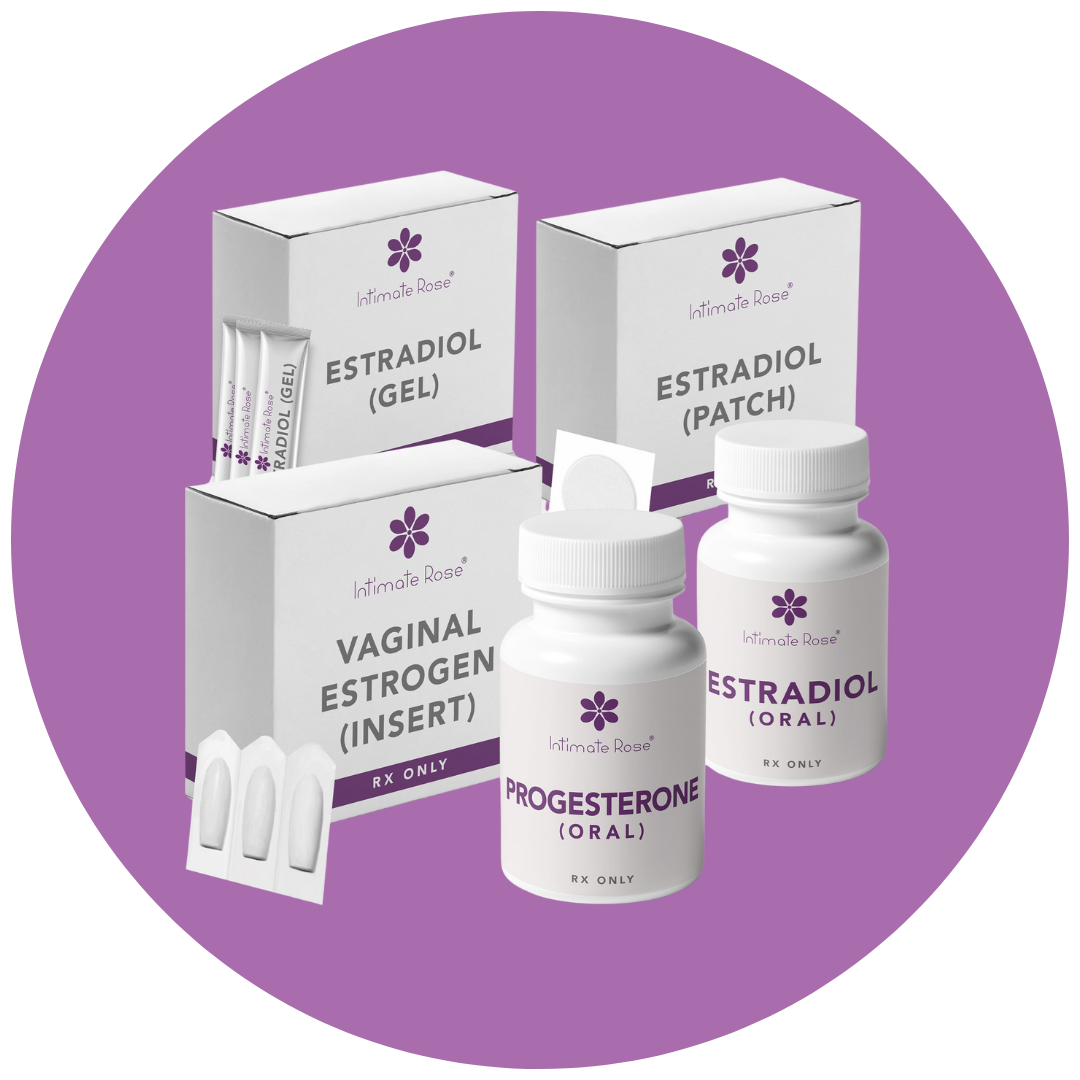

Get your personalized HRT plan!




